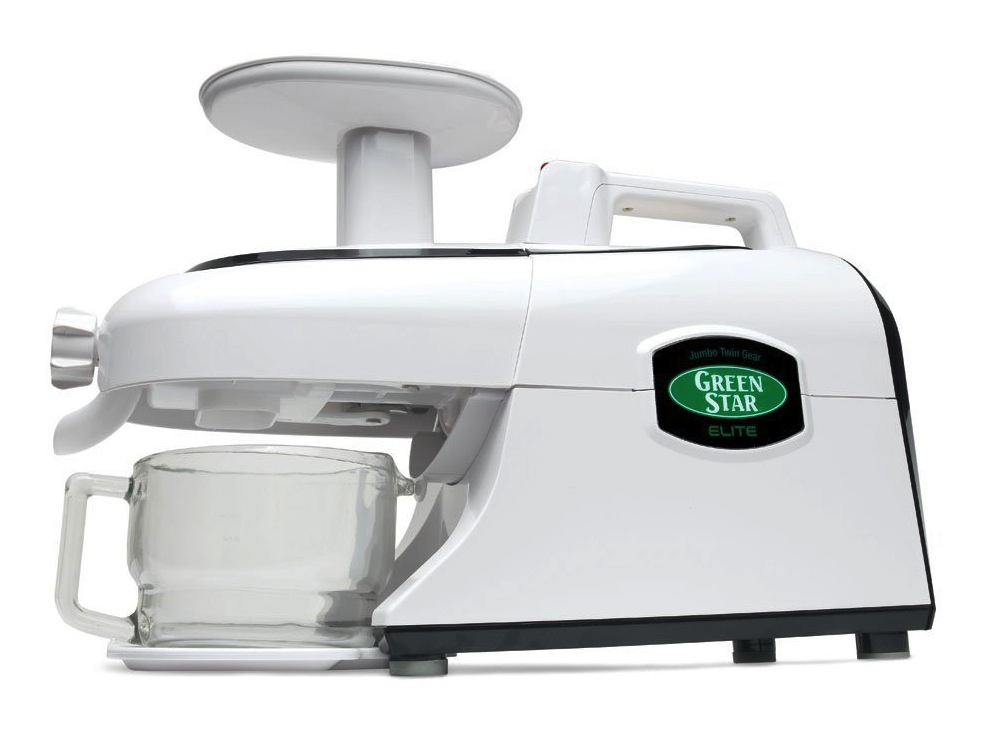There are a lot of juicers out there, and it can be daunting to filter through all the noise to the heart of the matter: You want a juicer that makes good juice, is easy to use and clean, and doesn’t cost an arm and a leg.
I considered the following factors in choosing the juicer I currently use, the Green Star Elite GSE-5000 Jumbo Twin Gear Juice Extractor.
1. Nutritional Quality
I became concerned with nutritional yield after reading how centrifugal juicers, the cheapest and most popular juicers on the market, produce the least juice. Also, the high rpm rate and pulp-flinging mechanism kills enzymes.
Google searches soon led me to an independent lab study done on different types of juicers. Anamol Laboratories found that the Green Star, a twin-gear juicer, had the highest mineral and juice volume yield, even compared to a 2-step hydraulic press like the Norwalk. Plus, at 110 rpm, it doesn’t heat up or oxidize the juice as much as centrifugals.
I realize the study shows up on the Green Star website which probably means it was requested by Tribest (the manufacturer), but I haven’t seen anything directly contradicting it.
Given the cost of organic produce, I wanted to make sure I was getting the most juice possible out of my veggies and fruits. The Green Star makes me feel slightly less guilty when I throw out the pulp, which is much drier than it was with my old Breville centrifugal.
2. Ability to Juice Greens
I wanted my juicer to do a good job with leafy veggies like kale, romaine lettuce, parsley, and spinach. My old Breville would hardly get any juice from kale; it did OK with romaine.
Twin-gear, single-gear, and masticating juicers all do well with greens. According to the Anamol Laboratories study, the Green Star extracts more minerals than the other types of juicers.
3. Cost
The Norwalk is the Rolls Royce of juicing. It’s a 2-stage industrial machine that masticates, then presses the chopped bits using a hydraulic press with tons of pressure. It also costs around $2500 new.
The next best thing to a 2-stage hydraulic press like the Norwalk is a twin-gear juicer such as the Green Star. I thought hard about getting the Super Angel, which is an all-stainless steel version of the Green Star, but it costs around $1200.
The Green Star costs around $530 and is made by Tribest. I like how it has a cookbook and a lot of online support like helpful YouTube videos.
Since I already knew I wanted a twin-gear juicer, I did not consider single-gear or masticating juicers, which cost anywhere from $250-400.
Centrifugals are the cheapest, ranging from $99-300.
Other Factors
I cared about ease of cleaning, but I was already used to scrubbing the basket of my Breville centrifugal and it was more important that I get the highest quality juice. The Green Star’s feeding chute is narrower than most centrifugals, which requires more cutting, but that is an unavoidable aspect of a slow-rpm juicer.
Versatility was a minor factor, but it’s nice that my Green Star can also be a food mill, pasta maker, and sorbet maker. As for noise level, twin-gear, single-gear, and masticating juicers are all quiet enough that you can carry on a conversation while juicing, whereas centrifugal juicers sound like high-speed blenders.
The best juicer is the one you will use every day.
That’s how I ended up with the Green Star. I’m pretty happy with it. The juice is thick and creamy, and cleanup is tolerable. The only bad thing is that carrots take a lot of strength to push into the gears, but that’s what husbands are for (hehe).
No matter which juicer fits you at this point in time, your health will benefit from drinking freshly-made vegetable juices.


This is a really helpful, thorough, review! I’m excited to read more about how juicing has helped you with your health.